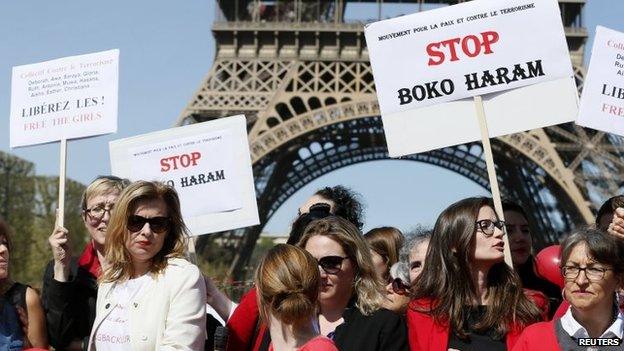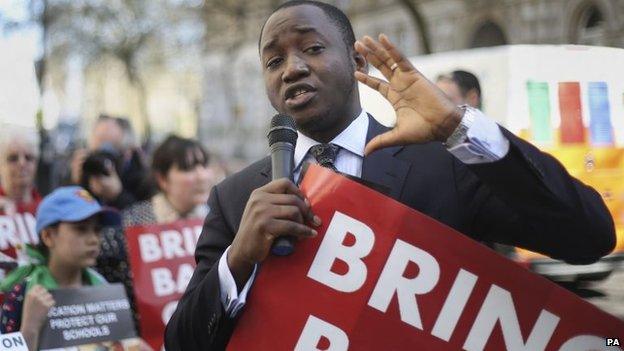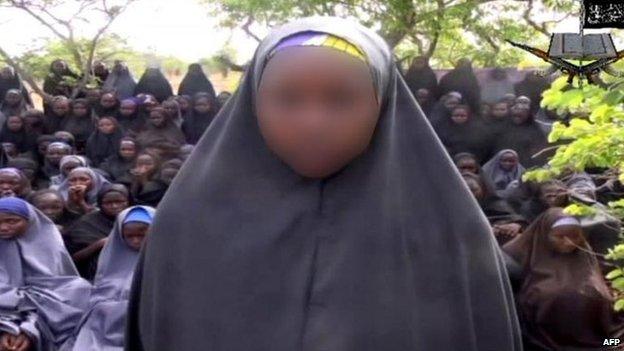Nigeria abductions: Vows to remember Chibok girls
- Published
- comments
Abdullahi Kaura Abubakar joined protesters on the streets of Abuja
Protesters around the world have vowed to remember the girls abducted by the Nigerian militant Islamist group Boko Haram one year ago.
A procession is being held in Nigeria's capital, Abuja, with 219 girls taking part to represent each missing girl.
UN Secretary-General Ban Ki-moon said the world must "never forget the kidnapped Chibok girls".
The mass abduction sparked global outrage, with nations including the US and China vowing to help find them.
There have been reported sightings of the girls, but none has been found.
The year since the kidnappings - explained in 90 seconds
The young women demonstrating in Abuja sang and chanted "solidarity forever" as they marched. They wore red T-shirts with the words "#365DaysOn" and "#NeverToBeForgotten".
Crowds gathered at a park in central Abuja, demanding the government tell them the truth about the girls, the BBC's Kaura Abubakar reports.
One woman travelled 750km (460 miles) to show her support, our correspondent adds.
Ceremonies are also being held in Lagos, and in France, the UK and US.
Boko Haram say the kidnapped girls have converted to Islam and been married off. One witness told the BBC that she saw more than 50 of them alive three weeks ago in the north-eastern town of Gwoza.

Activists held a candlelit vigil for the girls as night fell in Abuja

A solidarity protest was held in France

Protesters also gathered outside Nigeria House in London
Ahmed Salkida, a journalist with close links to Boko Haram, told the BBC he believed the girls were "well and healthy".
"According to [the jihadists] the girls have converted to Islam, so they regard them as very important," he said.

Eyewitness: "We peeked through a window and asked if they were really the Chibok girls"
Analysis: Will Ross, BBC Nigeria correspondent
It has been a whole year of agony for the relatives of the missing 219 Chibok girls. There have been a few sightings of some of the abducted students but very little official information from a government that has long promised to rescue them from the clutches of Boko Haram.
One mother told the BBC she sometimes arranges her 19-year-old daughter's clothes in the hope that she is about to return home.
The scale of this conflict is so grim that the Chibok girls represent just a fraction of those seized by the jihadists. Many have escaped partly thanks to a recent military offensive - but not the Chibok girls.

The mass abduction sparked one of the biggest social media campaigns of 2014, with the Twitter hashtag #BringBackOurGirls being used more than five million times.
Activists have spoken of relatives' anguish at still not knowing what happened to the girls, and criticised the government of outgoing President Goodluck Jonathan for not doing enough to find them.
Outgoing President Goodluck Jonathan says he believe the girls are being held "in a distant forest"
"Our president has said the girls are alive. Our question is: 'Where are our girls?'" Aisha Yesufu, a spokeswoman for the group, told the BBC.
Mr Jonathan told the BBC's Newsday that political rivalries had hampered the federal government's ability to respond to the Chibok attack.

A video released by Boko Haram last year showed 136 girls, three of whom spoke to the camera
Incoming president Muhammadu Buhari said his government would "do everything in its power to bring them home" but said he "cannot promise that we can find them".
The six-year Boko Haram insurgency has left thousands dead.
Amnesty International say, external the militants have abducted 2,000 girls and women since the start of last year, using them as cooks, sex slaves and fighters.